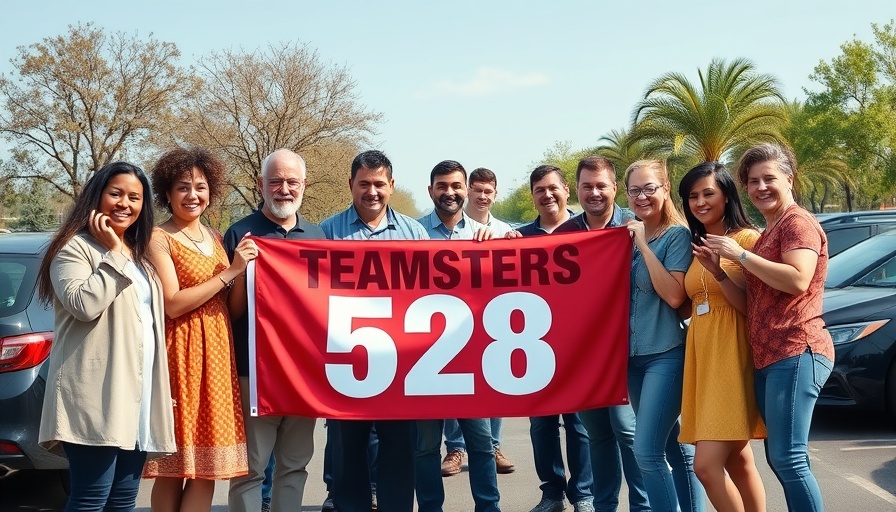
Understanding the Teamsters' Decision to Strike
In a decisive move, drivers at the Kroger fulfillment center in Forest Park, represented by Teamsters Local 528, have voted overwhelmingly to authorize a strike. This decision comes in response to repeated refusals by Kroger to negotiate a fair employment contract that includes strong wages, good benefits, and necessary workplace protections.
The Stakes: What the Drivers Are Demanding
The drivers' demands are not just about fair pay; they encompass broader concerns about workplace dignity and respect. Marion Jackson, a Kroger driver and Local 528 shop steward, highlighted the stark contrast between Kroger's substantial profits—over $2 billion in net earnings last year—and the inadequate offers presented to the workers. “This company can more than afford what we’re asking for,” Jackson stated, indicating the drivers' readiness to strike if serious negotiations do not occur soon.
The Bigger Picture: Kroger's Business Practices
Kroger's operations, with over 2,700 stores nationwide, contribute significantly to its profitability. Despite this financial strength, many workers, including those at the Forest Park fulfillment center, feel shortchanged. This raises essential questions about corporate responsibility and the treatment of employees who play a vital role in driving profits. Tom Erickson, Director of the Teamsters Warehouse Division, emphasized that the workers' efforts deserve recognition and fair compensation.
Community Support and Solidarity
Support for the drivers has extended beyond the workplace. Community leaders, such as Rev. Shanan E. Jones, President of the Concerned Black Clergy of Metropolitan Atlanta, have voiced their solidarity with the striking drivers. In Jones's view, it is unjust for a corporation to disenfranchise those whose hard work directly contributes to its success. “The men and women who drive and deliver Kroger’s products are the same ones driving Kroger’s profits,” he noted, underscoring the importance of fair treatment for these essential workers.
The Historical Context of Labor Movements
This situation reflects a larger narrative within American labor movements, where workers are increasingly organizing for better conditions and rights. The Teamsters union, founded in 1903, represents over 1.3 million workers and stands as a powerful advocate for labor rights. Understanding this historical backdrop enriches our perspective on current labor disputes, emphasizing the ongoing struggle for workers’ rights and justice in the workplace.
Future Implications: What Lies Ahead?
The potential for a strike raises important questions about the future of labor relations in corporate America. If the negotiations do not yield positive results, the implications could stretch beyond just these drivers—they might influence broader labor practices across the country. As such, community members, fellow workers, and corporate stakeholders will be watching closely to see how Kroger responds to these challenges.
Taking Action: What Communities Can Do
Effective labor movements rely not only on the workers involved but also on the support from their communities. Individuals can take steps to show solidarity—whether that means attending rallies, spreading the word on social media, or advocating for fair labor practices in their own workplaces. Communities, when united, have the power to influence corporate policies and ensure that workers’ rights are respected.
Conclusion: Standing Together for Change
The potential strike by drivers at the Kroger fulfillment center in Forest Park is a significant moment that highlights critical issues surrounding worker rights and corporate accountability. It’s vital for the community to engage with these issues actively, acknowledging that standing up for fair labor practices benefits everyone involved. By supporting the drivers and their cause, we reinforce the importance of dignity, respect, and fair compensation in today’s workforce.
As the situation unfolds, consider how you can engage with labor issues in your own community. Whether it’s supporting local strike actions or advocating for worker-informed policies, your voice can make a difference.
 Add Row
Add Row  Add
Add 




 Add Row
Add Row  Add
Add 

Write A Comment